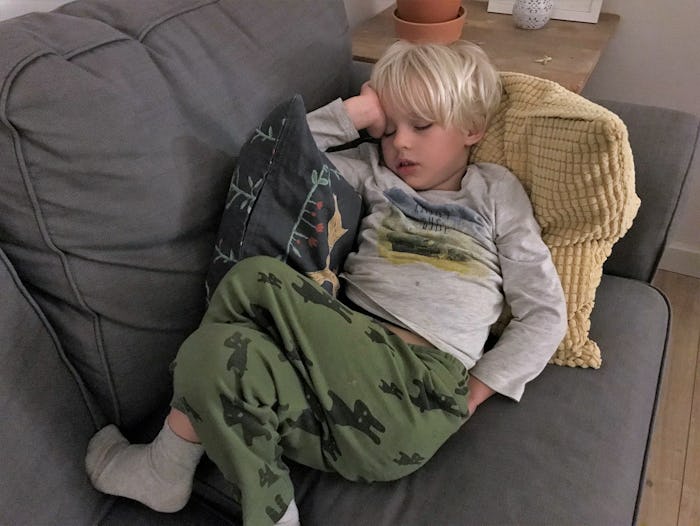Little Kid

Is Your Kid Just Refusing Bedtime, Or Is It Insomnia?
I mean, sometimes they just want to delay bedtime, but sometimes it's really a health concern.
I have never been a good sleeper. If you ask my mother, this started the day I was born. I didn't sleep through the night for the early years of my life, and as a child, I was routinely up very late. This all sounds par for the course — "My kids never sleep!" is a frequent parenting snafu — but are some kids just bad sleepers, or can children have insomnia?
As it turns out, children can and do get insomnia, just like adults, says Yale pediatric sleep specialist and author of It's Never Too Late To Sleep Train Dr. Craig Canapari. He tells Romper that infants, children, and teens can have insomnia, and according to the International Classification of Sleep Disorders, there are two parts to insomnia, regardless of age. "The first is difficulty with sleep, whether with difficulty with falling asleep, staying asleep, getting up too early in the morning, resistance to bedtime, or needing a parent to fall asleep," Canapari says. "The latter two are quite common in young children."
The second part of "oh yes, this is insomnia" is that the trouble your child is having at bedtime is causing problems with themselves or their family. And that gets to be quite a lot.
But Canapari says that parents might also be setting expectations too high when it comes to the amount of sleep children need. "Your 2-year-old may sleep 12 hours a night and take a two-hour nap every day. But if you expect your 5-year-old to sleep 24 hours a day in a 24-hour period, you will be disappointed."
My son would take two two-hour naps each day, but at night would only sleep 10 hours. My daughter would take a single two-hour nap during the day, but she'd sleep a solid 13 hours at night. I didn't think anything of it until I realized that my daughter was never going to sleep past 5 a.m. (And is still, at age 9, a very early riser.)
But it wasn't insomnia for either of them. For me as a child, it definitely was. Canapari says that the first sign of insomnia is fighting at bedtime, and holy crap we've all been there, but amp that up for a kid with insomnia. "Prolonged periods between lights out and falling asleep," can also be a sign, but night time awakenings after 6 to 9 months of age are not uncommon.
Thankfully, there are resources available and steps parents can take to help their children when they're suffering. "The first step is checking with your pediatrician to see if your child’s sleep patterns are normal for ages, and making sure there is no medical problem causing these issues," Canapari says. After that, he says to parents, "You owe it to yourself to try some behavioral techniques to help her — and you — sleep better." It's a rough time, so strategizing is critical. "Remember, your child may be able to make up lost sleep in the car seat, at day care, etc. But you can’t be the parent you want to be if you are exhausted."
Boston Children's Hospital also noted that your child's insomnia can stem from other sleep disorders (like obstructive sleep apnea or restless legs syndrome); anxiety or stress; a mental health or developmental condition like autism, depression, ADHD, or asthma; certain medications (like antidepressants or steroids); and even caffeine. If you can find something here that resonates with you and your child, it's worth seeing if removing that factor will help. Less caffeine during the day, finding out what causes your child stress, etc.
Above all, give yourself some grace. You're tired, too, and while you can classify some children as "night owls," it's best if they get adequate sleep. Talk to your child's providers, and make a plan. It might take a while, but there is hope.
Expert:
Dr. Craig Canapari, Yale pediatric sleep specialist and author of It's Never Too Late To Sleep Train